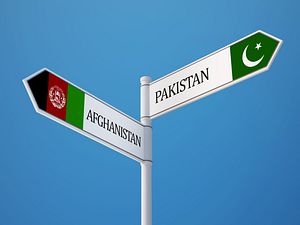As the United States’ planned deadline for withdrawal from Afghanistan fast approaches, the situation on both sides of the Durand line is far from optimal. In Kabul, presidential candidate Abdullah Abdullah just boycotted the hard-brokered power-sharing deal and audit that temporarily defused a broader crisis over the future of Afghanistan’s democracy. In Islamabad, Nawaz Sharif’s democratically elected government is under siege from Imran Khan and his supporters. For the United States, everything is not going to plan in the perpetually troublesome “Af-Pak” region.
In Washington’s ideal scenario, Afghanistan’s presidential palace would have had a new occupant by this time, who’d have been settled in and acclimated to the demands of running Afghanistan. This person would have presumably signed the Bilateral Security Agreement (BSA), thereby eliminating a great deal of ambiguity about the United States’ future role in Afghanistan (both candidates in the run-off, Ghani and Abdullah, have said that they would sign the BSA if elected). With Pakistan, Washington has gotten somewhat used to never having an ideal state of affairs, but it at least expected Nawaz Sharif’s government to maintain order and rein in the military. Neither has proven true.
As Washington has learned over time, events in Kabul and events in Islamabad tend to interact over time. With today’s scenario, planners in the Pentagon are anxious about the logistics of withdrawing U.S. military hardware from Afghanistan through a Pakistan in political flux. Imran Khan, leader of the Pakistan Tehreek-e-Insaaf (PTI) party, is notoriously hostile to the United States. His supporters have blocked and attacked NATO supply convoys in Khyber Pakhtunkhwa in protest of U.S. drone strikes in Pakistan. The outcome of Pakistan’s current crisis remains uncertain, but should Khan gain ground within Pakistani politics, it is likely to make matters significantly more complicated for the United States. Additionally, Pakistan’s military — a seemingly perennial opponent of stability in Afghanistan — could make important gains from the crisis as well (Michael Kugelman takes a much more in-depth look at this over at Foreign Policy).
Washington needs to act quickly and with a high degree of diplomatic creativity to prevent the emergence of a “nightmare scenario” in both Afghanistan and Pakistan. In Afghanistan, the possibility exists of a deeply polarizing schism emerging along ethnic lines owing to the outcome of this election — particularly if the outcome is seen as tainted or unjust. Kerry’s success in bringing both Ghani and Abdullah back to the negotiating table in the first place and getting them to agree to a comprehensive audit should be extended. Abdullah’s boycott could have catastrophic longer term results. In Pakistan, the civilian crisis could make way for a military coup. Although the infamous position of Chief of Army Staff (CoAS) is currently occupied by a non-politically inclined general, Raheel Sharif, events on the ground could force the army’s hand.
The primary problem for U.S. diplomacy in these countries is now a lack of credible leverage. In Afghanistan, it must carefully encourage reconciliation between the two candidates without creating a perception that the electoral process is anything but “Made in Afghanistan.” In Pakistan, as Shuja Nawaz of the Atlantic Council notes, “the best solution would be a compromise that allowed the judiciary to play a neutral role in assessing the allegations of election fraud.” The United States can do little to make this outcome more likely. Meanwhile, the U.S. needs the Pakistani military to continue its campaign against militants in the country’s tribal areas. Given the stakes and the difficulty of intervening directly, Washington should be prepared for any outcome in these countries, positive or negative.

































